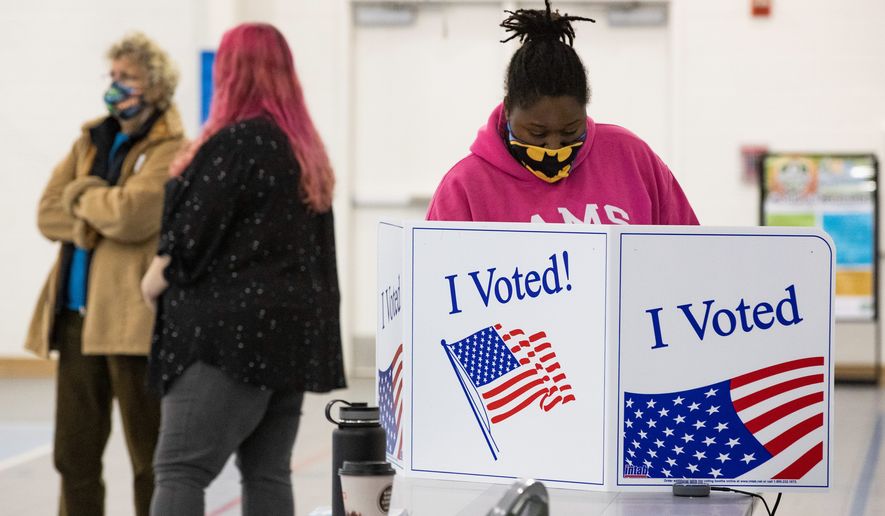Liberal groups that pushed for expanded mail-in voting for the 2020 elections are fighting to prevent Republicans in battleground states from tightening the rules that likely helped Democrats score wins last year.
The national liberal advocacy group Stand Up America and its partners in Arizona mobilized Tuesday to stop legislation in the state that they labeled “GOP voter suppression bills.”
They warned of more than 160 proposals across 33 states that would make voting more difficult. But their top concern is three states — Arizona, Georgia and Pennsylvania — where they think new rules could change electoral outcomes in the 2022 midterm elections and beyond.
“These proposals aren’t random. They are part of a concerted effort by Republicans to make it harder for the same Black, Indigenous, and people of color who came out to vote in record numbers in 2020 to vote in 2021 and beyond,” Christina Harvey, Stand Up America managing director, told reporters. “It’s no surprise that the greatest number of voter suppression bills are being introduced in key swing states with Republican state legislatures, states like Georgia, Pennsylvania and Arizona.”
Supporters of the Republican efforts argue that changes are necessary to restore confidence in elections and eliminate doubt about the integrity of the vote.
Arizona is the top priority for Stand Up America because of the momentum for new legislation.
“Lawmakers do not decide who wins elections, the people of Arizona do, the voters do,” said Alex Gulotta, All Voting is Local Action Arizona state director. “There have been more than 50 bills proposed in Arizona that are designed to undermine our elections. They are designed to let less voices be heard, and they are coming at a time when leaders in our state legislature are still disputing the 2020 election results.”
Along with Mr. Gulotta’s group, Stand Up America has partnered with Progress Arizona and LUCHA Arizona to fight Senate Bill 1069. That bill, which was introduced last month, would take voters off of the “permanent early voting list” if they fail to vote using a mail-in ballot for two consecutive primary and general elections. The bill does not affect voters who return the mail-in ballot at a dropbox or polling place.
While similar bills failed in previous years, Republicans’ attention to election security and voter integrity has given legislation new momentum. The Arizona Republican Party underwent a face-lift in recent years, as its newest iteration looks to distance itself from the party’s old guard, including censuring several previously prominent figures who were more centrist including Gov. Doug Ducey, former Sen. Jeff Flake and Cindy McCain, widow of the late Sen. John McCain.
Several Republican proposals affecting elections in Arizona are competing for lawmakers’ attention, but SB 1069 has the liberal groups most alarmed. State Sen. Michelle Ugenti-Rita of Scottsdale sponsored the bill and said it should be inconsequential to those choosing not to vote by mail.
“There’s a cost associated with sending out ballots to people who aren’t voting by mail. There’s also an integrity component,” Ms. Ugenti-Rita said at a state Senate committee meeting last month.
The liberal groups disagree and see the action in Arizona as the tip of the iceberg that could unmake the rules that helped them score big wins in 2020. Ms. Harvey said such GOP proposals “could actually make a difference in election outcomes” and she said she was also keeping an eye on Georgian proposals to undo automatic voter registration and limit no-excuse absentee voting.
At the federal level, the groups want Democratic lawmakers controlling Congress to advance a new voting rights act that would trump proposals pushed by GOP-run state legislatures.
Stand Up America previously partnered with Democratic Sens. Amy Klobuchar of Minnesota and Ron Wyden of Oregon to secure emergency legislation to fund states’ work to reach voters who were quarantining or socially distancing because of the coronavirus. Ms. Klobuchar and Mr. Wyden also helped lead the charge for $400 million in election assistance funding included in a previous coronavirus relief package passed by Congress.
• Ryan Lovelace can be reached at rlovelace@washingtontimes.com.




Please read our comment policy before commenting.